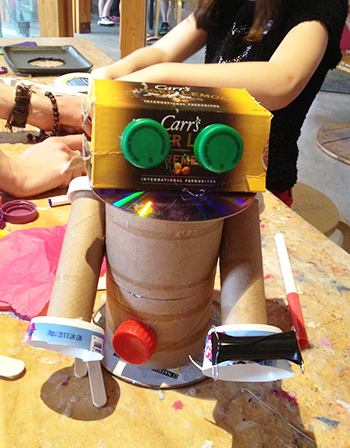X-RAY RUNS: Apply for Beamtime
2017 Nov 1 - Dec 21
2018 Feb 7 - Apr 3
2018 Proposal/BTR deadline: 12/1/17
2018 Apr 11 - Jun 4
2018 Proposal/BTR deadline: 2/1/18
During the early months of 2013, Xraise approached the educational team at the Sciencenter in Ithaca about the possibility of hosting a new project where guests would have the opportunity to tinker with materials. The materials would include donated recyclables already available at the reinvention station at the Sciencenter as well as materials provided by Xraise, including hobby motors, batteries, LED's, electrical tape and other miscellaneous items. Guests would be free to play and build whatever they would like, with the activity being open-ended and entirely creative. In order for such an initiative to be successful, staff at both organizations would need to rely on the oversight of a dedicated set of volunteers. Stephanie Hilz, a graduate student in the Biochemistry, Molecular and Cell Biology program at Cornell University, accepted the challenge of running a "making stuff" space for visitors from throughout the country to visit at the Sciencenter. Hilz named the program "MotoInventions" and has watched it grow from an hour-long program twice a month servicing 25-30 patrons, to a weekly program with nearly 100 visitors attending the open-ended design program each month.
"It has been incredible to watch MotoInventions develop over the past three and a half years," writes Hilz. "When it started, we were designing each session around a single project, such as "build a car" or "create your own dancing robot." However, we quickly saw that part of what MotoInventions could provide was not just the experience of building a cookie-cutter project with a motor, but also the chance to learn how to bring your own idea to life. One of the most enjoyable aspects of being a MotoInventions volunteer was hearing what someone wanted to make, and then helping him or her come up with a plan to make it. The ideas were often impressively original, and also quite special in that they reflected the participants' own unique interests."
Louisa Smieska, a postdoctoral scholar at CHESS and MotoInventions volunteer for the past year, has also been impressed by the unique designs generated by patrons. "It is so much fun to see how creative the kids are," states Smieska. "Just last week we saw everything from cars and helicopters to a bird with a twirling tail to a spinning flowerpot!"

A robot created by MotoInventions enthusiasts.
Stephanie Hilz also enjoyed being able to observe the learning process taking place during the MotoInventions building sessions as visitors built, tested and iterated their designs based on their successes and failure. "Another aspect of the program was its ability to draw adults, in addition to children, into exploring how motors and electricity work." Continues Hilz, "There were adults who would tape batteries onto their inventions without connecting them to the motors and be initially frustrated that their motor was not turning. They would then figure out how the wires need to be connected to each end of the battery for the electricity to flow into, and thus power, the motor. There was an enormous satisfaction that lit up the faces of both adults and children alike when they finally figured something like this out and got their invention to work."
Other MotoInventions volunteers echo Hilz's sentiments. Ravi Patel, graduate student in the Molecular Biology and Genetics department at Cornell University has been volunteering for the program for the last two years, "The best thing about the MotoInventions program that makes me go there again and again is to see the rewarding feeling on kids' faces when they test their MotoInventions project and see it working. It's just incredible," says Patel.
Parents normally accompany their child to the Sciencenter, but do not always interact with the exhibits and frequently watch while their children play. "MotoInventions provides a special experience for participants, giving them a chance to create something that they normally wouldn't be able to do at home or at school," states Hilz. The program has been able to connect kids with their adults in an unthreatening, safe and supportive environment where the adult is no longer the "expert," but is a novice to making — discovering concepts and techniques alongside their child. Smieska reflects on her experience with families, "It is really rewarding to see adults and kids working together and building confidence in new skills."
After facilitating nearly 100 different MotoInventions sessions over the past 40 months, Stephanie Hilz has completed her doctorate and is hanging up her volunteer apron at the Sciencenter. She is passing on the "making stuff" torch to other enthusiastic volunteers, including Patel, Smieska and Sierra Cook, graduate student in Applied and Engineering Physics at Cornell University. "I am a much stronger teacher and scientific communicator because of MotoInventions. It has given me many wonderful memories and a chance to give back in a meaningful way to my community."

Submitted by:
Lora Hine, CHESS and Stephanie Hilz, Cornell University
07/15/2016
